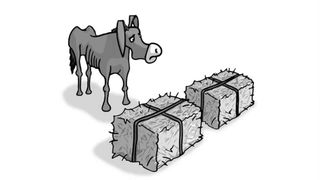Clearly, most of our daily decisions are not earth-shattering, but you can imagine how paralysis in the decision-making process would render us virtually incapacitated every day if we let it. We are called upon to be courageous, reliable, and trustworthy with regard to the outcome of our decisions (i.e., to make decisions consistent with our core values and beliefs). In addition, we are also called upon to engage in a transparent and consistent decision-making process (i.e., to clarify for others how we make decisions and the logic of our decision-making).
According to Susan Jeffers, author of Feel the Fear and Do It Anyway, when fear or anxiety crop up during your decision-making, the fear is based either on your belief that you won't be able to handle the outcome of your decision or on your doubts about whether you have enough correct information to make the best decision.[1] Thus, our indecision may lie in our fears and doubts about the outcomes of our decisions or about the process of decision-making:
The burdens that make us groan and sweat,
The troubles that make us fume and fret,
Are the things that haven’t happened yet.
-George W. Bain
Fear of Poor Decision Outcomes
Ever hear the story about the frog that fell into a deep rut in the road and, tries as he might, he could not get out? Mrs. Frog, standing above the rut, admonished, cajoled, beckoned, and belittled him to no avail.
"Get out, come on, let’s go," she pleaded.
But Mr. Frog, down in the deep rut, said simply, "There is no way I can get out of this rut."
Leaving him there, Mrs. Frog hopped down to the pond and, in a few minutes, Mr. Frog appeared beside her on their favorite lily pad.
"I thought you said you couldn’t get out," she exclaimed.
He responded, "A big truck came along, and I had to."
Sometimes our fears paralyze us to the point that we cannot decide anything. This is represented by the philosophical concept referred to as "Buridan's Ass," which states that, given the option of two equally wonderful piles of hay, the ass will starve to death, because it cannot choose.
Sometimes we resign ourselves to the fact that we will never be able to do, or be, or have whatever it is we need or want. And sometimes, like Mr. Frog, we are forced to make a decision, whether it is the one we want to make or not. We let other people or our circumstances dictate our decisions, rather than depending upon our inner voice to help us.
So, how do we handle these fears and avoid these behaviors?
Consider how someone who is fearful about the outcome of a decision might behave. First, he or she may procrastinate, putting off the decision and avoiding the outcome altogether. Procrastination is a major symptom of one’s inability to make a decision. In his research on procrastination, Neil Fiore found that
We procrastinate when we fear a threat to our sense of worth and independence. We only act lazy when our natural drive for fruitful activity is threatened or suppressed. The deep inner fears that cause us to seek such unproductive forms of relief are suggested to be the fear of failure, the fear of being imperfect, perfectionism, and the fear of impossible expectations, of being overwhelmed. These fears prevent us from working on and attaining possible goals and relationships. [2]
Procrastination is a means of escape from reality. The person who procrastinates is like the person who avoids conflict, i.e., “If I don’t deal with the issue or problem, it will go away.” But rarely does a problem just disappear, particularly problems that real people and real organizations face. More often than not, problems increase in scope, depth, or impact as time passes and we put off the decision.
Solving procrastination is really a matter of analyzing what the predominant fear is about making a decision. For example, for those of you who have a high need for approval, you can reduce your fear of failing by seeing that your worth is not totally determined by the outcome of any one particular decision. For those of us who have a high need for control, the fear lies in letting go of the decision-making process or losing control over the outcome of a decision.
Keeping a record of the circumstances surrounding your avoidance of making a decision, noting such things as what excuses were used and what your thoughts and feelings were about the decision or decision process, will place the focus on whether your fears are real or imagined. Such analysis will help reduce your tendency to procrastinate, but it may not completely solve the problem. You have to actually stop procrastinating! Like the poem goes,
Procrastination is my sin,
It brings me endless sorrow,
I really must stop doing it.
In fact…I’ll stop tomorrow.
“Optimal” Choice
In addition to procrastination, a person may also overvalue the importance of the outcome of a decision and react by vacillating between choices. The more important that you perceive the outcome to be, the more likely you will be to evaluate in detail all of the available choices. The problem is that we get hung up in deciding on the “best” outcome. We try to find all the information and data to help us to know, for sure, what we should do so that we don’t make a poor decision.
Missing Information
None of us knows enough to avoid making some mistakes. Likewise, none of us could possibly gather all the information necessary to know everything before we make a decision. In fact, recent scientific evidence suggests that the more information and time we have to make a decision, the less likely we are to make a good one.[3]
We often get so overwhelmed with information that we become paralyzed among all the choices, like the mother who took her three children into a small ice cream parlor for an ice cream cone. The man behind the counter asked, "Chocolate or vanilla?" The mother asked him, "Why don’t you have more flavors?" "Lady," he answered, "if you only knew how much time it takes some people to make up their minds between chocolate and vanilla, you wouldn’t ask that!"
Herbert A. Simon, 1978 Nobel Prize winner for his work on decision-making and cognition, coined the term satisficing to explain why we can never know enough to make the optimal decision. He reasoned that we can never achieve the optimal or best alternative, primarily because we are limited by not knowing the total consequences of our decisions. He termed this limitation bounded rationality. Since we can’t know everything before we are asked to decide and, therefore, cannot choose the best alternative among every possible one, we have to be content with an alternative that meets some, but perhaps not all, of our criteria.
For example, let us imagine that your car has just died and you need another one. Before you get another car, you make a list of what you must have in a car, e.g., four doors, automatic transmission, blue exterior, CD player, and automatic windows. You also determine that you cannot afford a brand new car and, therefore, will need to purchase one that is at least two years old.
At this point, how do you decide which car you should purchase? You can never evaluate every two-year-old (or older) car with your stated attributes; it would be impossible to locate them all. So, you begin to look at the available options within a “bounded” rationale. In other words, you restrict your options to geographic area, price point, time commitment, etc. At some point, you will be faced with several alternatives that meet your specifications. But you will never know if the car you ultimately choose is the best car—only whether or not the car is a satisfactory choice in that it meets all the criteria you said you must have. That’s satisficing!

Working on Your Indecision
If you are someone for whom indecision is a challenge, we offer some very practical advice to help you deal with your fears and doubts about making decisions.
- Become more aware of the fears that underlie your indecisiveness. Keep a journal of decisions that you struggled with and analyze why you struggled with them. Or write down what you are afraid of as you begin the decision-making process, noting if any of the reasons have an approval or control basis. This will help bring those fears out into the open so that you can begin to question their validity.
- Set some specific and realistic criteria for your decision. Doing this ahead of time will prevent you from vacillating after you’ve determined all the alternatives. You’ll remember in our car purchase example the color, the number of doors, transmission type, etc. were determined before starting to look at options. This makes an evaluation of your choice easier in the end since anything that doesn’t meet the criteria is not a viable option.
- Ask for others’ input for options or alternatives. Most of the time, your fears and anxieties occur when a decision rests on you. Although you may be making the ultimate decision, sometimes it is helpful to get other people’s ideas about alternatives you might consider. This doesn’t mean you have to adopt their ideas; it merely means you are in an information-and-opinion-gathering mode. It is your choice to include their ideas or not. But it usually doesn’t cost anything to ask, and they may give some great information or ideas that may never have occurred to you!
- Accept the concept of “bounded rationality.” If you continually search for more and better data, you will never make a decision. Set limits on how much time and effort you will expand on a particular decision, and stick to those limits.
- Broaden your experiences. This is probably the single most helpful effort in making good decisions. By exposing yourself to a variety of different experiences, you are able to look at things from different perspectives. For example, consider spending some time in another culture, country, or even in another part of town if you live in a large, urban area. This experience puts your immediate concerns into their proper perspective. It can also provide alternative ways to see problems and issues, comparing them to seemingly unrelated situations, and offer new opportunities and alternatives.
Of course, you could always approach decision-making as the Persians did in 450 B.C., as recounted by Herodotus in The Histories:
If an important decision is to be made [the Persians] discuss the question when they are drunk… the following day, the master of the house...submits their decision for reconsideration when they are sober. If they still approve it, it is adopted; if not, it is abandoned. Conversely, any decision they make when they are sober is reconsidered afterward when they are drunk.
References
[1] Jeffers, S. (1987). Feel the Fear and Do It Anyway, New York: Ballantine Books.
[2] Fiore, N.A. (1989). The Now Habit. New York: Tarcher/Putnam, division of Penguin Putnam, Inc.
[3] Dijksterhuis, A., Bos, W., Nordgren, L.F., and van Baaren, R.B. (2006). On Making the Right Choice: The Deliberation-Without-Attention Effect, 311, 5763, pp. 1005 – 1007.
[4] Nayar, V. (2014). Managing 3 types of bad bosses, Harvard Business Review, December 1. Retrieved from https://hbr.org/2014/12/managing-3-types-of-bad-bosses, February 6, 2017.
[5] A Leader’s Guide to After-Action Reviews, Headquarters, Department of the Army, September 1993. Retrieved from http://www.au.af.mil/au/awc/awcgate/army/tc_25-20/tc25-20.pdf (public domain).




